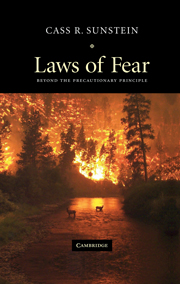7 - Democracy, Rights, and Distribution
Published online by Cambridge University Press: 05 September 2012
Summary
What is the argument for embodying people's actual willingness to pay (WTP) in regulatory policy? Why should anyone care about actual WTP at all? If we're trying to convert the reduction of danger into monetary equivalents, why is WTP even relevant? Don't people have the right to be free from (certain) risks, whatever their WTP? And what, most generally, is the relationship between deliberative democracy and cost-benefit analysis?
I hope that the discussion of fear has suggested the beginnings of an answer. Suppose that a regulation would cost $200 million annually and that it would save twenty lives – by, say, reducing the permissible level of arsenic in drinking water from 50 parts per billion to 10 parts per billion. (In fact these numbers are realistic for arsenic regulation.) If we refuse to convert the savings into monetary equivalents, we will have a hard time producing a coherent system of regulation. One policy might value a life at $10 million, another at $2 million, another at $40 million, another at $200,000. Of course different valuations would be justified if they stemmed from the nature of the risk or the affected population – and of course we need an account that justifies one assignment of monetary equivalents rather than another. But without some kind of effort to use monetary equivalents, randomness and incoherence – and susceptibility to powerful private interest groups – are likely. I have emphasized that the bottom-line numbers are not decisive.
- Type
- Chapter
- Information
- Laws of FearBeyond the Precautionary Principle, pp. 149 - 174Publisher: Cambridge University PressPrint publication year: 2005
- 1
- Cited by



